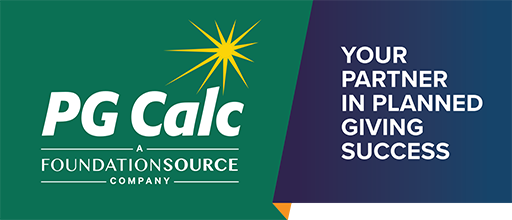In 2009, the financial crisis was in its infancy, the stock market was plunging, and no one was sure where it would all end. In response, PG Calc staff devoted substantial energy to analyzing and discussing with our clients gift planning in a down economy. Six years later, most donors no longer fear that we may be entering an economic depression, but the financial markets remain volatile and many donors remain nervous about their financial futures.
Donor concern can take two forms
A donor’s concern about the economy can take two forms. First, the donor may have a generalized concern about high unemployment, low interest rates that make fixed income investments unappealing, the budget deficits faced by governments at all levels, or, especially, big swings in the stock market. In a poll we conducted during a PG Calc Webinar, 84% of respondents indicated that stock market volatility is the economic concern mentioned most often by their donors. Budget deficits ranked a distant second at just 9%.
As donors examine their personal situations, they may quickly develop a much more particularized concern. The value of their assets, as well as the income derived from those assets, may have declined significantly over the last few years. If they are still working, they may be concerned about the future of their jobs, along with the likelihood of finding a comparable new position in a reasonable amount of time. If they are retired, they may be very nervous about whether one or more sources of the cash flow on which they depend will remain reliable.
Separate the real from the perceived
Try to help your donors concentrate on developing a level-headed awareness of their own circumstances. The fact is that some individuals are weathering the current financial storm quite well. Others have experienced relatively minor setbacks and are still well-positioned to avoid sustaining major setbacks. In short, for some donors there may be quite a distinction between the overall economy and what the reality is for them.
An initial challenge you will face is to discern what is actual for a donor and what is perception. A given donor may continue to be wealthy enough to make a lifetime and/or a testamentary planned gift, but if her net worth has declined by 10 or 20 percent in recent years, she may not feel sufficiently wealthy to proceed. Your challenge is to help the donor explore whether she should modify her perceptions in light of facts.
Many donors are reluctant to share details of their finances. This means that you must be prepared to have a more conceptual conversation. For example, if a donor indicates that she won’t even consider a gift until the stock market improves, you could probe a bit to learn what the donor would regard as sufficient improvement in terms of a publicly available measure, such as a stock market index. This, in turn, will give you a sense of whether it might be prudent simply to suspend further discussion for a period of time. It might also lead you to ask a follow-up question about the extent to which the donor’s actual portfolio has tracked a particular index in the past and/or could be expected to do so going forward. You might inquire why the value of the donor’s portfolio is important to her. Do the stocks constitute a significant source of income? Has the donor earmarked the assets to serve long-term objectives, such as financing a purchase or providing for heirs? Whatever the response, it should give you a better idea of the donor’s thinking and how a gift might be structured to satisfy the donor’s concerns.
Gifts that may appeal to donors who are nervous about their finances
There are a variety of approaches to giving to your charity that may appeal to your donors who are nervous about their finances. The approach to suggest to a specific donor will depend on what you have learned about them using the questions suggested above, other questions you come up with yourself, and any other sources of information about the donor that are available to you.
Many gift planners have begun to focus on bequests and beneficiary designations as ways to appeal to donors who are concerned about their finances or about the economy generally. These end-of-life arrangements give the donor the flexibility to modify them later or cancel them altogether, if necessary. This sort of flexibility can be of great comfort to a donor who is nervous about her financial future, but wants to act on her desire to support a charity.
While bequests and beneficiary designations are the bread and butter of many planned giving programs, here are some other gift arrangements to consider when working with a donor concerned about the economy.
Small gifts
Just what is “small” will depend on the circumstances, but donors are sometimes pleasantly surprised to learn that a scale about which they have concerns can be reduced. If a small gift (for example, a $5,000 bequest) is truly all a donor can afford, then that is better than no gift at all and it brings a sense of relief and satisfaction to the donor if she was incorrectly assuming only a much larger amount would be acceptable.
By contrast, even though a particular donor may clearly be able to afford a larger gift, it can make sense initially to explore a “starter gift.” In this case, avoid creating the impression that a lower level commitment is all the charity is seeking from the donor overall. Rather, make explicit that what’s being proposed is an experiment. Likewise, establish when the possibility of making one or more subsequent larger gifts will be revisited so that the donor will not be surprised when the conversation is reopened.
Even small gifts should still be meaningful. Part of the appeal of such a gift in the eyes of the donor is that she will be having some immediate impact. In time, the concept of increasing this support can be more compelling if the donor knows she is already doing something of significance.
Contingent Gifts
If the flexibility of a standard bequest or beneficiary designation is not sufficient to address a donor’s concerns, then maybe she will be willing to make a gift that is not only revocable but also conditional. Consider the following sample bequest language:
“If [name of primary beneficiary] does not survive me, or shall die within ninety (90) days from the date of my death, or as a result of a common disaster, then I give to ABC Charity, currently of [address] or its successor organization, [describe amount of cash, property, or percentage of residual estate] . . .”
Actually, there are any number of contingencies that could be identified, depending on what keeps the donor awake at night. The donor could even design her gift so that the charity will receive one gift if a certain contingency is met and another gift if a separate contingency is met, or the size or nature of the gift could depend on one or more contingencies.
Most beneficiary designation forms do not accommodate contingent designations very readily. Nevertheless, it may be that the donor’s lawyer can draft a customized designation provision that will be acceptable to the administrator of the account or other arrangement.
In some cases, it can be worthwhile to check back with a donor to see if perhaps the passage of time has made him or her less concerned and more willing to make a gift that is still revocable but has fewer strings attached to it. In this regard, a contingent gift can be like a small gift, in that each can be employed as a “starter gift.”
Loans to a Charity on Favorable Terms
This is a relatively underutilized option, but one that could be very appealing to a donor who is concerned about the economy. The donor makes a formal, documented loan to a charity and charges the organization either no interest or very little interest. Typically, the term of the loan is indefinite. Under most agreements, the donor will need to give the charity advance notice in connection with a request that some or all of the principal be returned to her.
If at the end of the donor’s life the loan still has not been repaid, the charity refunds the principal to the donor’s estate unless the donor’s will instructs the estate to forgive the debt as a charitable gesture. In that event, the charity becomes the absolute owner of the funds and the gift qualifies for an estate tax charitable deduction. Just as with a bequest, the donor receives no income tax benefit during life. In addition, if the donor does choose to charge nominal interest on the loan, she will be taxed on any interest paid by the charity. Nevertheless, the charity has immediate access to the loaned money, albeit subject to the donor’s right to take back some or all of what has been loaned at any time.
Charitable Gift Annuities
A donor who hesitates to make an outright gift may find an arrangement that offers payments in return to be much more palatable. Of all the life income gifts, the gift annuity is the arrangement that appeals to most of these donors. Gift annuities can be established with relatively small amounts - the minimum contribution amount at most charities is $5,000 or $10,000 - and offer secure fixed payments for life that typically are partly tax-free. Gift annuities also offer substantial flexibility in how their payments are structured. In their most common form, payments start immediately, which appeals primarily to donors in their seventies and older. Alternatively, payments can be deferred until one or more years after the gift date, an approach that can be attractive to donors in their fifties and sixties. For donors who are unsure of when they want payments to start, it is even possible to create a flexible gift annuity that provides a schedule of possible payment start dates and amounts from which the annuitant(s) can pick at a later time.
Conclusion
The key to working successfully with any donor, but especially one who is nervous about current economic conditions, is to listen and listen well. What are the donor’s concerns? What are their sources? Is the donor’s perception of her financial situation in line with reality? If not, are there ways you can help her modify her perception? Alternatively, are there giving options you can suggest to her that acknowledge her concerns and therefore make a gift more palatable? If you are able to answer these questions for each donor you talk to, you will be able to help many of them gain the satisfaction of lending support to an institution they care about.

